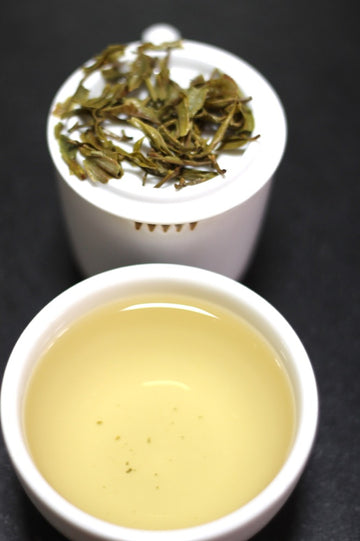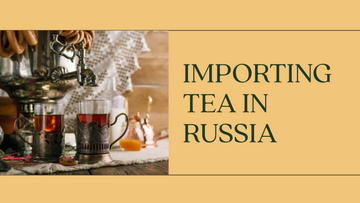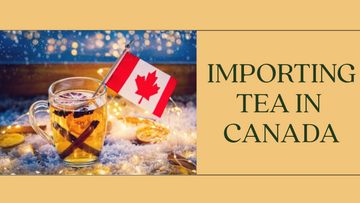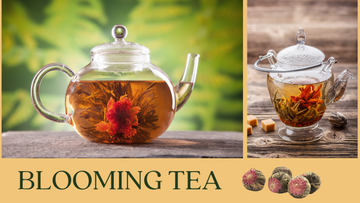Organic Vs. Regular Tea: A Discussion About Organic Versus Regular Indian Tea And The Differences Between The Two
によって Nikita Mittal オン Sep 09, 2021

'India' and 'tea' are inseparable! Chai tea is a popular and delightful treat in our country. Tea leaves are slowly cooked in hot boiling water to release the flavors, then blended with milk and sugar to serve hot. Most Indians prefer sipping chai more than just one or two times a day! Even foreigners start drinking chai tea as soon as they visit the Indian chai stalls.
Why Do Indians Love Tea So Much?
Since the arrival of the British East India Company, tea cultivation has gained pace. It does not mean that drinking tea was not a part of Indian culture before 1830. Herbal tea has been in production for many centuries. And, presently, India is the second-largest exporter of tea leaves in the world.
Organic Tea vs. Regular Tea
As a sincere consumer, you often go after the 'organic' tag while shopping. You believe that organic products have numerous benefits, and those are certainly better than conventional ones. When the question comes to organic tea vs. regular tea: which is better? The matter is complicated. Why? You can identify organic vegetables by their color and shape, but what about organic tea? Well, you should know what you are consuming. Another important question needs to be answered: is organic tea better than regular tea?
What is Organic Tea?
The tea leaves, which include no chemical pesticides and fertilizers, are organic tea. Organic tea is nutritious, safe, and healthy if it gets developed by certified producers and under strict monitoring of responsible authorities. Otherwise, there are chances of consumer deception. Some unethical producers don't use the best lands, degrade the environment, and sell their unsafe tea products under organic certification.
The fundamental principles of organic farming include:
- Farming must be friendly to the plants, soil, animals, and people.
- Ecological systems should be the basis of a fair cultivation structure.
- The health of the environment, present and future generations must remain protected.
- Before getting 'organic certification', the land must remain free from chemicals, pesticides, and herbicides for a minimum of 3 years. And, organic goods should be GMO-free.
What is Regular Tea?
The regular tea cultivation method includes artificial fertilizers containing nitrates. It is to secure the growth of tea plants in a non-organic way. The fact is, most tea-producing companies prefer selling regular tea over organic tea as it can be produced in larger quantities and in a lesser time. The production cost is comparatively cheaper and thus, cultivating non-organic tea is overall beneficial for their business.
According to fitness nutrition specialists, regular tea may offer fewer health benefits than organic tea, but this does not imply that its consumption is unsafe! People have been drinking regular tea during the last couple of decades, and no such side effects have been reported due to the same.
Difference Between Organic Tea & Regular Tea
Regular or non-organic tea cultivation includes additives, such as artificial flavor, synthetic color, and pesticides by crossing the safety limit. It uses chemical fertilizers too. These altogether may trigger several health risks such as allergies, respiratory disorders, abnormal growth of the fetus, and may cause cancer!
But opting for organic tea does not buy you a 100% safety guarantee. It is crucial to get certified and genuine organic tea from the stores. The organic cultivation process is expensive, and many dishonest and unethical manufacturers use false organic labels on their products to cheat the consumers. Thus, they make an enormous profit by not maintaining the quality standards at all!
Regular tea is tastier than organic tea. The enhanced taste is due to the inclusion of chemicals and hormonal medicines.
Is Organic Tea Healthier than Regular Tea?
Research results of New Castle University, United Kingdom, suggest that organic products may include 18-69% more antioxidants than non-organic products. But when it is the question of tea, they say that different types of tea offer variable amounts of antioxidants. For example, some variations of green tea leaves include 16mg EGCg/ g of dry leaves. There are some other varieties available too, which have 203mg EGCg/ g of dry leaves. And, the surprising thing is that the first variation can be an organic tea, and the second variation can be a regular tea! The number of antioxidants can vary with the complete environment of farming and the cultivation and processing of the tea leaves.
Can Organic Tea be Unhealthy?
YES! Sadly, it is true. Consuming a cup of genuine organic tea, you are not having any residual elements or herbicides through it. However, there remain some hidden dangers in your cup of organic tea:
- Organic herbicides and pesticides.
- The guidelines list of organic products does not include how much heavy metals' inclusion is allowed.
- Organic manure used in the cultivation method may contain mycotoxins and harmful bacteria.
- Adulteration
Heavy metals such as copper, lead, cadmium, and arsenic are harmful to health, especially if consumed regularly. Such metallic particles are present in the soil, water, and even in the air. These can corrupt any plant.
According to a Belgium study report, organic and regular tea leaves can contain harmful elements for human health. Organic farming may cause more heavy metals such as mercury, lead, and cadmium into the crops. The report also mentions that the side effects of organic fertilizers and pesticides can't be measured due to the lack of research data.
Adulteration of Tea: What is it?
Tea can be adulterated very easily, even if it is organic. Adulterants can be any object that can make tea better to taste, smell, or even look. For example, very old tea leaves can be dried again and colored as new leaves. Many ingredients can be included to increase the weight of the tea leaves. Tea adulteration chances are higher for teabags than in loosely sold tea leaves.
So, it can be said that both organic and regular tea can be of bad quality depending on the values and ethics of the producer. There is a wide range of varieties available for tea leaves, and all of them have some particular characteristics. It is observed that small farms run by farmer families follow good ethical principles than the big tea companies, even if they are not organic farmers.
Here are some more facts to make you understand what you are buying from the market.
Are 'Natural' and 'Organic' Labeled Tea the Same?
While you go shopping, you can see the 'natural'/'all natural' label on the tea packets. It does not mean that the tea leaves are organically grown. Natural tea refers to the leaves having natural flavors and color, and no artificial elements have been used. Hence, the label 'natural' has nothing to do with 'organic' principles.
Which Tea is Safe for Drinking Every Day?
Choosing organic tea is the best option, as it offers higher health benefits than conventional tea. Organic tea leaves include no residue of synthetic herbicides or pesticides. But on the same page, it is necessary to buy some from authentic certified producers to get original organic products!
Nothing is good in excess! Restrict your tea consumption to 2 cups/day. Otherwise, iron absorption in your body may get delayed.
The rest is in your hands!




